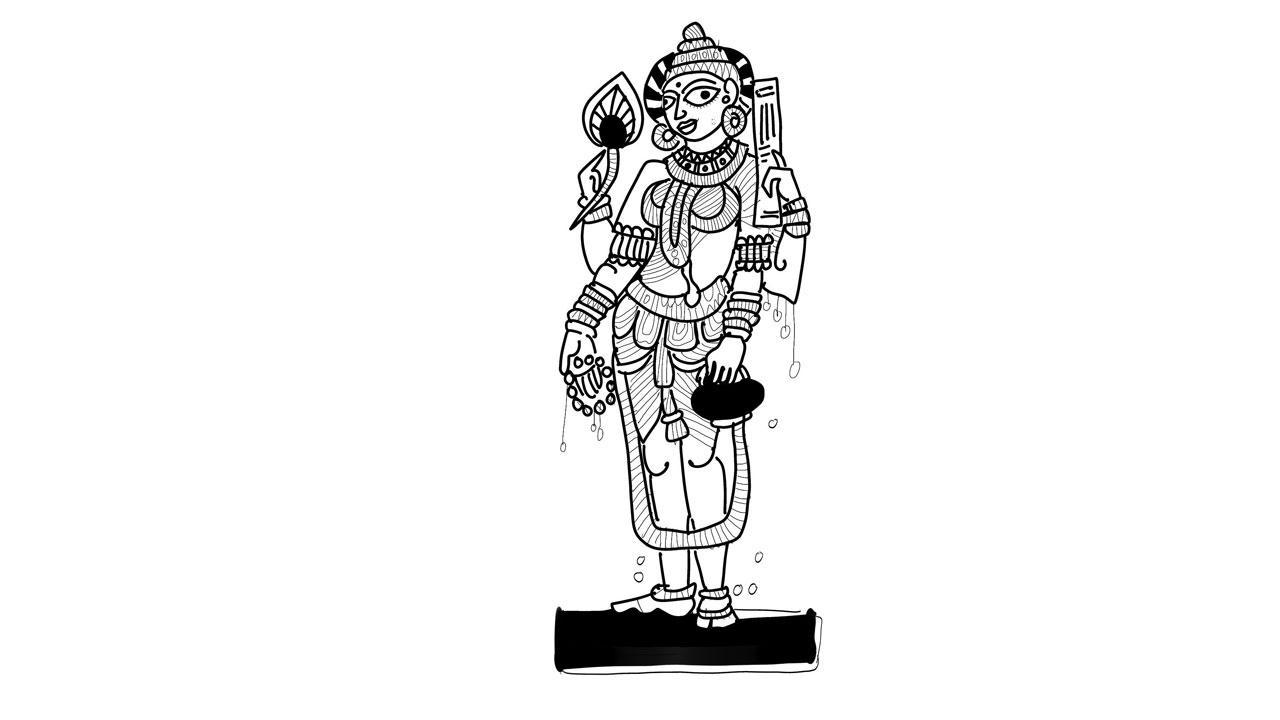This lack of empathy indicates knowledge without wisdom that Sanatkumars are referring to. This Brahma-vidya is the lodestone of Indian Knowledge Systems.

Illustration/Devdutt Pattanaik
 The first list of an educational syllabus in India comes from the Chandogya Upanishad, when the Sanatakumar sages ask Narada what subjects he is proficient in. Narada gives the following list: the four Vedas, the fifth Veda (itihasa-purana), the Vedanga (phoenetics, etymology, grammar, prosody, geometry, time-keeping, ceremonies), logic, earth science (physics, chemistry, biology) knowledge of gods (deva), ancestors (pitr), serpents (sarpa), stars (jyotisha). The Sanatkumar point out that the list does not include self-awareness (brahma-vidya) and so Narada’s knowledge is superficial, like memorisation, lacking understanding, and assimilation, preventing application.
The first list of an educational syllabus in India comes from the Chandogya Upanishad, when the Sanatakumar sages ask Narada what subjects he is proficient in. Narada gives the following list: the four Vedas, the fifth Veda (itihasa-purana), the Vedanga (phoenetics, etymology, grammar, prosody, geometry, time-keeping, ceremonies), logic, earth science (physics, chemistry, biology) knowledge of gods (deva), ancestors (pitr), serpents (sarpa), stars (jyotisha). The Sanatkumar point out that the list does not include self-awareness (brahma-vidya) and so Narada’s knowledge is superficial, like memorisation, lacking understanding, and assimilation, preventing application.
Ravana, is a case in point. Ramayana describes him a Vedic Brahmin, author of many books related to medicine and astrology and engineering. But he does not respect humans. He strives to be dominating and territorial. He drives his brother out of the house and claims his property. He demands complete loyalty and submission from his brothers. He does not respect a woman’s consent. This lack of empathy indicates knowledge without wisdom that Sanatkumars are referring to. This Brahma-vidya is the lodestone of Indian Knowledge Systems.
Chandogya Upanishad is said to be older than Buddhism, revealing ideas that are 2,700 years old. By this time, Indian Knowledge systems were organised, we can claim. The list was expanded later to include the knowledge (veda) of music (gandharva), war (dhanur), healing (ayur) and architecture (sthapatya). Another set of ideas emerged around 1,500 years ago. These were called the shastra (organised knowledge). These included knowledge of dharma (society), artha (economics), and kama (art and pleasure).
By the 10th century, there are texts on occult sciences (Tantra) and elaboration of mystical ideas (siddha-yoga). They spoke not just about body and breath, but also about connecting to, and controlling, cosmic energies and manipulating nature, space and time. Was this spirituality, sorcery or proto-science? We can always speculate as there is no proof either way.
But all these knowledge systems are highly Brahmanical, the lore of priests. This was transmitted orally in Sanskrit and later put down in writing. Much of Indian Knowledge Systems were not captured in texts and so are lost. There is little documentary trace of the various technologies (vidya) of the weaver, the potter, the metalsmith, the farmer, the herdsman, the trader, the butcher. We can blame the caste system for it.
Caste system had a good side and a bad side when it came to knowledge systems. The good side was that knowledge was kept safe by a community of people, transmitted over generations, and improved over time. The bad side was that it was kept in isolation, inaccessible to outsiders. Modern knowledge systems are meant to be open sources, to be shared by all, except when patent laws are applied.
Today, Indian educators are being encouraged to remind children about the Indian Knowledge System, so that they do not feel all knowledge came from the West. They need to be made aware, and proud, of the contribution of their ancestors in fields such as mathematics, calculus, and science. But we should be careful not to assume all Indian knowledge came only from Brahmins. We need to acknowledge the contributions of Buddhists and Jains as well as members of other castes and communities and tribes of Bharat. Knowledge exists in all languages of India, not just Sanskrit. And in our eagerness to be nationalistic, we should not succumb to the temptation of pseudo-history and pseudo-science that will make us the laughing stock of the world.
The author writes and lectures on the relevance of mythology in modern times. Reach him at devdutt.pattanaik@mid-day.com
 Subscribe today by clicking the link and stay updated with the latest news!" Click here!
Subscribe today by clicking the link and stay updated with the latest news!" Click here!










